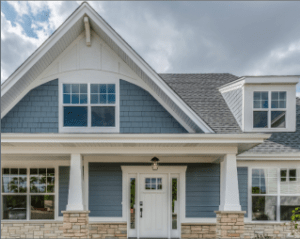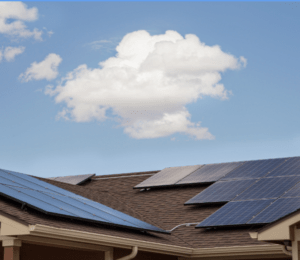Exploring the Different Roofing Options for Houses in Northern Arkansas: Their Pros and Cons
Choosing the right roof for your house in Northern Arkansas is a crucial decision that affects both the aesthetic appeal and functionality of your home. Each type of roof has its unique characteristics, advantages, and disadvantages. In this comprehensive guide, we will explore seven common types of residential roofing options found on houses in Northern Arkansas. From the classic asphalt shingle roof to the innovative solar roof, by gaining insights into their characteristics, benefits, and drawbacks, you’ll be better equipped to make an informed decision that best suits your needs for your home.
1. Asphalt Shingle Roof
Asphalt shingle roofs are a popular choice for houses in Northern Arkansas due to their affordability, versatility, and ease of installation. They offer a wide range of colors and styles, allowing homeowners to achieve their desired aesthetic. These roofs provide good protection against weather elements. However, it’s important to note that asphalt shingle roofs may have a shorter lifespan compared to other roofing materials. Regular maintenance and periodic replacement of damaged shingles are necessary to ensure their longevity.
Pros:
- Affordability and versatility
- Wide range of colors and styles
- Good protection against weather elements
Cons:
- Shorter lifespan compared to some other roofing materials
- Regular maintenance and replacement of damaged shingles are required for longevity

2. Metal Roof
Metal roofs are renowned for their exceptional durability and longevity, making them a popular choice for homeowners seeking a long-term roofing solution. These roofs offer excellent resistance to fire, rot, and insect damage, providing peace of mind for homeowners. With their ability to withstand harsh weather conditions, including heavy rains and high winds, metal roofs are highly reliable. Additionally, they are energy-efficient, reflecting heat to keep homes cooler during the hot summer months. However, it’s important to consider that metal roofs can have a higher upfront cost compared to other roofing materials. Some homeowners may also find the noise of rain or hail hitting the metal surface to be bothersome.
Pros:
- Exceptional durability and longevity
- Resistance to fire, rot, and insect damage
- Ability to withstand harsh weather conditions
- Energy-efficient, helping to keep homes cooler
Cons:
- Higher upfront cost compared to other roofing materials
- Noise from rain or hail hitting the metal surface

3. Clay Tile Roof
Clay tile roofs are known for their timeless beauty and exceptional insulation properties. They add an elegant touch to any home and offer excellent durability, withstanding even the most extreme weather conditions, including high winds and hail. Additionally, clay tiles are resistant to insect damage and do not rot, ensuring long-lasting protection for your home. It’s important to note, however, that clay tile roofs are heavier than other roofing materials, necessitating proper structural support during installation. Furthermore, they can be more expensive upfront, and occasional maintenance may be required to replace broken or damaged tiles.
Pros:
- Timeless beauty and elegant appearance
- Excellent insulation properties
- Exceptional durability against extreme weather conditions
- Resistant to insect damage and rot
Cons:
- Heavier than other roofing materials, requiring proper structural support
- Higher upfront cost compared to some other roofing options
- Occasional maintenance is needed to replace broken or damaged tiles

4. Wood Shake Roof
Wood shake roofs are favored for their natural and rustic aesthetics, adding a charming appeal to homes of various architectural styles. They provide excellent insulation, keeping homes cool in the summer and warm in the winter, while also offering an eco-friendly roofing option. However, it’s important to note that wood shake roofs require regular maintenance to ensure their longevity. This includes periodic cleaning, treatment for mold and rot prevention, and occasional replacement of damaged shakes. Additionally, it’s crucial to consider that wood shake roofs are more susceptible to fire hazards and may have a shorter lifespan compared to alternative roofing materials.
Pros:
- Natural and rustic appearance
- Excellent insulation properties
- Eco-friendly roofing option
Cons:
- Regular maintenance is required, including cleaning, treatment, and occasional replacement
- More susceptible to fire hazards
- Shorter lifespan compared to some other roofing materials

5. Slate Roof
Slate roofs are highly regarded for their unparalleled elegance, durability, and exceptional longevity. With their distinctive appearance, slate roofs can enhance the aesthetic appeal of any home, exuding a sense of sophistication. Not only are slate roofs fire-resistant, but they also require minimal maintenance and boast an impressive lifespan that can surpass a century. However, it’s important to consider that slate roofs come with a higher price tag compared to other roofing options. Additionally, their installation requires specialized expertise due to the weight of the slate tiles, and any repairs or replacements can be labor-intensive and costly.
Pros:
- Unmatched elegance and distinctive appearance
- Exceptional durability and longevity, lasting over a century
- Fire-resistant and low-maintenance roofing option
Cons:
- Higher upfront cost compared to other roofing materials
- Specialized installation is required due to the weight of the slate tiles
- Repairs and replacements can be labor-intensive and expensive

6. Flat Roof
Flat roofs are known for their distinctive minimal or no slope, setting them apart from traditional sloped roofs. These roofs offer flexibility in design, making them suitable for various purposes such as creating additional outdoor living space or accommodating HVAC units and solar panels. Flat roofs are also cost-effective in terms of installation and maintenance, providing an appealing option for homeowners. However, it’s important to note that flat roofs require regular inspections to ensure proper drainage and prevent the accumulation of water, as the lack of slope can make them susceptible to water pooling. Additionally, their lifespan may be relatively shorter compared to other roofing types.
Pros:
- Versatile design allowing for additional outdoor space and equipment installations
- Cost-effective option for installation and maintenance
- Can be used as a foundation for renewable energy sources like solar panels
Cons:
- Regular inspections necessary to ensure proper drainage and prevent water pooling
- Potential shorter lifespan compared to sloped roofs
- Requires specialized installation techniques for effective waterproofing

7. Solar Roof
Solar roofs have emerged as a sustainable and energy-efficient choice for homeowners. By integrating solar panels into the roof design, these roofs harness the sun’s energy to generate electricity, reducing reliance on traditional power sources. Solar roofs offer long-term cost savings by reducing energy consumption and lowering utility bills. However, it’s important to consider that the initial installation cost of solar roofs can be higher compared to conventional roofing options. Additionally, the effectiveness of solar panels depends on factors such as the amount of sun exposure, potential shading from surrounding structures or trees, and local regulations governing solar installations.
Pros:
- Renewable and sustainable energy source
- Potential long-term cost savings through reduced energy consumption
- Environmentally friendly choice with reduced carbon footprint
Cons:
- Higher upfront installation cost compared to traditional roofing
- Effectiveness impacted by factors such as sun exposure and shading
- Local regulations may impact the feasibility of solar roof installations

Choosing the right type of roof for your house in your particular area is a significant decision that impacts both the aesthetics and functionality of your home. Understanding the advantages and disadvantages of each roofing material is essential to make an informed choice. Whether you opt for the affordability of asphalt shingles, the longevity of metal roofs, or the elegance of clay tiles, each type has its unique benefits and considerations. Consult with roofing professionals, consider your budget and preferences, and prioritize durability, energy efficiency, and maintenance requirements.
By making a well-informed decision, you can enjoy a beautiful and reliable roof that will protect your home for years to come. Contact us to learn more about the various types of roofs available and receive expert advice tailored to your specific needs.


